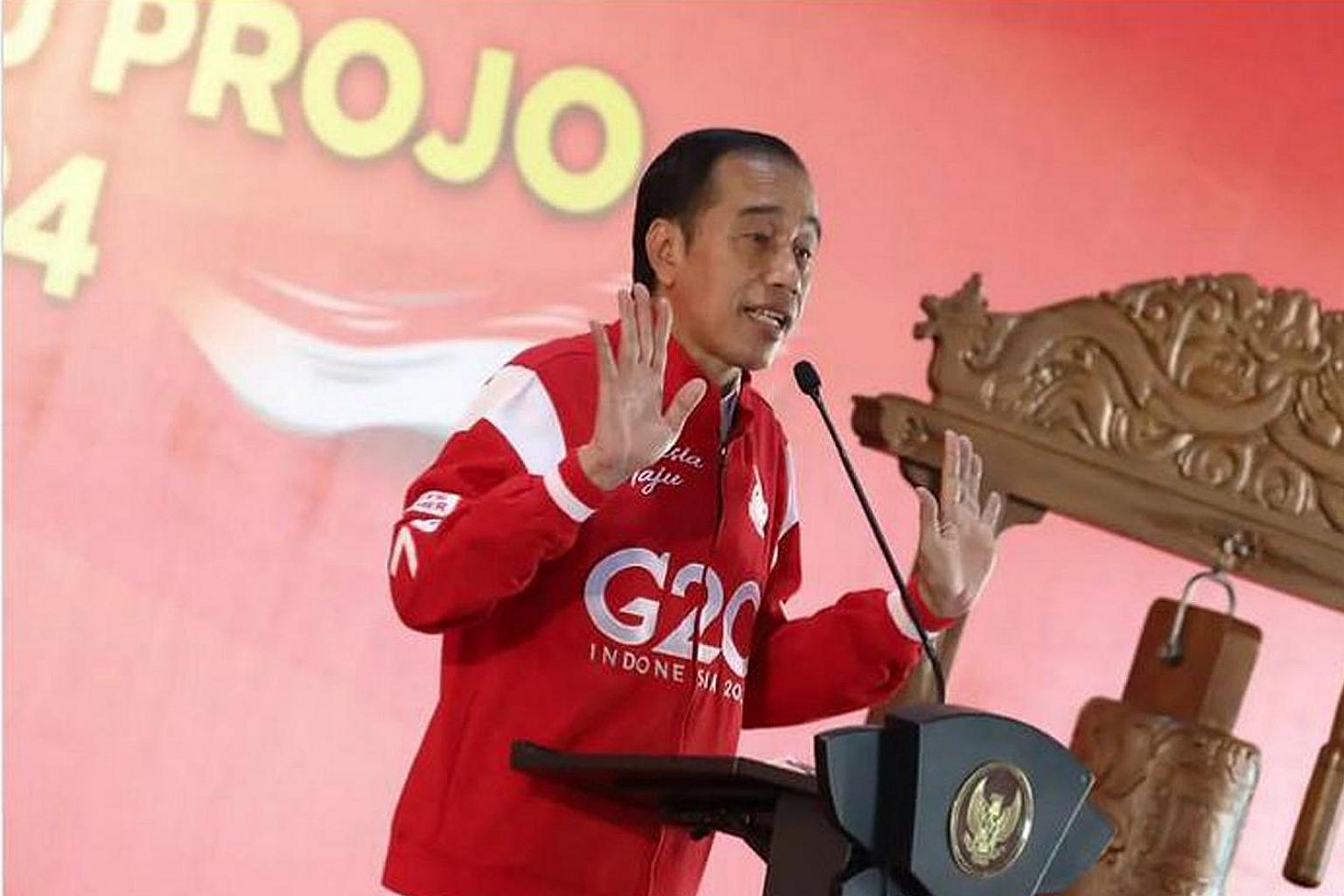Indonesia president support group Projo to back candidate who continues Jokowi's legacy
Sign up now: Get insights on Asia's fast-moving developments

Indonesia President Joko Widodo addressing members of his volunteer group Projo during the group’s national working meeting on May 21 in Magelang, Central Java.
PHOTO: DPPPROJO/INSTAGRAM
JAKARTA - Projo, a seven-million-strong volunteer group aligned with Indonesian President Joko Widodo, has dampened speculation that it will become a political party, but said it will back a candidate who will further the President's legacy when his term ends in 2024.
In an interview with The Straits Times, Projo chairman Budi Arie Setiadi said that while the group has sufficient resources to form a party, it can better focus on "nationhood and the people's agenda" if it does not have to worry about staying in power as a political party.
"We have agreed with Pak Jokowi not to change our course each time a new president comes in. We want to pursue sustainability so that what he is doing now will be continued (by his successor)," said Mr Budi, who is also deputy minister for villages, development of disadvantaged regions and transmigration, calling Mr Widodo by his moniker.
Among the President's unfinished priorities are key infrastructure projects, hindered by budget reallocation to social safety nets during the Covid-19 pandemic, and the development of Indonesia's new capital in East Kalimantan.
At the Projo congress in Magelang, Central Java, on May 21, the 61-year-old President, who is head of the group's advisory board, hinted at supporting Central Java Governor Ganjar Pranowo, 53, at the next presidential election in 2024.
"On politics, let's not be hasty, even though the one we may support (in 2024) is likely here," he told the crowd at the event attended by Mr Ganjar.
His preference, however, clashes with the stance of the largest party - the Indonesian Democratic Party of Struggle (PDI-P) - of which Mr Widodo, Mr Ganjar and Mr Budi are cadres.
During the opening of the party's national working meeting on June 21, chairman Megawati Soekarnoputri asserted that endorsing a presidential candidate was her prerogative.
"Whoever makes the manoeuvre will be out. There should not be anyone in the PDI-P putting their eggs in two or three baskets, doing the manoeuvre," she said.
The ruling PDI-P, which secured 128 seats, or 22 per cent of parliamentary seats in 2019, is the only party that can nominate a pair of presidential and vice-presidential candidates in the next election without having to coalesce with other parties.
It is believed that the party will likely endorse Ms Megawati's daughter, Parliamentary Speaker Puan Maharani, 48, whose electability in major polls has lagged behind Mr Ganjar's.
Dr Kunto Adi Wibowo, executive director of the Indonesian Public Opinion Research and Discussion Group, said that Ms Megawati's comments sent a signal to Projo volunteers not to force the party into supporting Mr Ganjar.
"It is still possible that PDI-P nominates Mr Ganjar, but the chance is slim, and it will also depend on how far Ms Puan can drive people's favour towards her," he told ST.
The lecturer at Padjadjaran University's Faculty of Communication cited another scenario where Mr Ganjar quits PDI-P and joins another party, which forms an electoral coalition with other parties.
"In this case, Projo can follow wherever Mr Ganjar aligns himself with," he said.
Observers say that a new coalition comprising the oldest party Golkar, the National Mandate Party (PAN) and the United Development Party (PPP) - named United Indonesia Coalition (KIB) - may accommodate Mr Ganjar as a presidential or vice-presidential candidate to run with Golkar chief Airlangga Hartarto, 59, whose electability in various polls has remained low.
Mr Budi said that Projo has yet to pick a presidential candidate to support, and will rely on the result of a "democratic, open and transparent" multi-stakeholder consultation process that it will conduct across Indonesia's 34 provinces from July to March next year.
He added that Projo will be open to collaborating with "any political party".
Professor Firman Noor, a senior researcher at the Political Research Centre of the National Research and Innovation Agency, however, said that if KIB endorses a candidate like Mr Ganjar who has contrasting ideologies with the coalition's supporters, this will further erode its already weak cohesiveness.
"It will be tough for the PAN and PPP to explain to their grassroots," he said in reference to the Islamic-leaning parties. Mr Ganjar's supporter base, he noted, is in Central Java, East Java and regions dominated by non-Muslims.
He added: "The deal can be made at the elite level. But it will be hard to consolidate at the base."
Mr Ganjar was also recently named as one of the three potential presidential candidates by Indonesia’s fourth largest party NasDem, along with Jakarta Governor Anies Baswedan and military commander General Andika Perkasa.


